Grimca Udhëtimesh nëpë Shkodër, Elbasan e Durrës…
November 19, 2023 || views
Nga Nada Dosti
Evlija Çelebiu
Udhëpërshkrimet (Sejahatnameja)
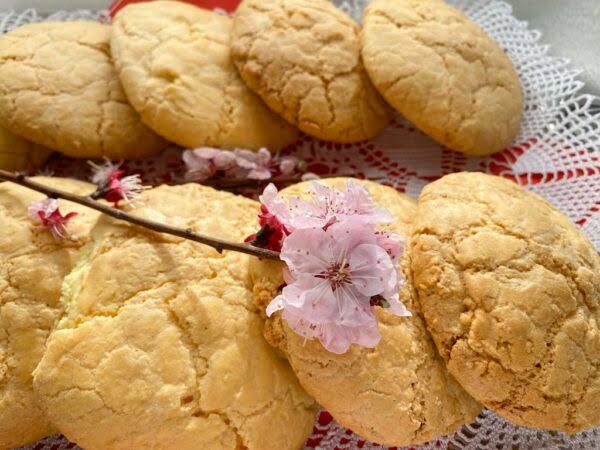
Nëpër rrugët e Skampit, çdo kalldrëmë është volusur me firmën “Vura-Dorë” . Mu aty pranë pazarit, ecin pa shkelur mbi tokë zana dhe hyri parajse. Me fustane thurur prej mëndafshi mbledhur tek Ullishtet dhe larë në ujrat e Shkumbinit. Flokë të gjata gërshet deri në midis dhe faqe si ballokume. As të bardha as të verdha. Lëkurë ngjyrë kafeje dhe sy prej smeraldi. Flasin një tjetër gjuhë me lloj lloj notash muzikore, sa lule ka në fustanet e tyre. Esnafët thurin qilima, kurse fëmijët ëndrra. “Vajta n’Elbasan për met ble fustan” por fustane si dikur nuk gjeta.
Gjeta radio të vjetra që transmetonin kujtime prej një tjetër zamani. Kulla e Sahatit si zonjë e randë qëndron stoike mu në mes të sheshit, dhe vëzhgon të gjithë prej lartësisë së saj të fisme. Frymohet ajër i rëndë, i njëjti që për vite me radhë vrau fëmijë dhe gjymtojë plot shpirtra të tjerë. Në këto rrugica pa kalldrëma vegjetojnë krijesa gjysëm njeri. Fati i tyre shkruar mbi fletë të ndritshme prej një tjetër bote, jo më vonë se dyzetëditë bashkëjetese në barkun e nënës, dhe vulosur me damgë qymyri prej regjimit të kohës. Aroma simite me bugaçe përzier me Tavën e famshme kanë cilësi magjike për të të rikthyer pas në kohë, në fëmijërinë e hershme.
Parfum jasemini mbulon gjithë qytetin, ndërsa përçohet në çdo cep zhurma e thyerjes në dysh të një ballokumeje kur ndahet me të tjerët. Sepse Mikpritja, në qytetin ku dyert për mysafirin nuk mbyllen kurrë, është personazhi kryesor i një përralle mbrëmjeve pranverore. Përrallë të cilën gjyshja ia rrëfen mbesës duke ia lidhur në dorë një byzylyk prej peri trengjyrësh të gërshetuar, thurur me iluzionin se do e ruajë nga fantazmat dhe bishat e egra. “Gjumë të ëmbël” dhe “natën e mirë” kthehen në lutje që e shoqërojnë vogëlushen deri mëngjesin e pesëmbëdhjetë marsit.
“ Por ka aq shumë vajza të bukura dhe të pastra shqiptare nga fshatrat përreth, saqë duken si zana me fytyrën dhe pamjen e tyre engjëllore.. “
Karafila dhe Luleborë
“Karanfilat që m’ka Shkodra medet sa t’bukur jan’”
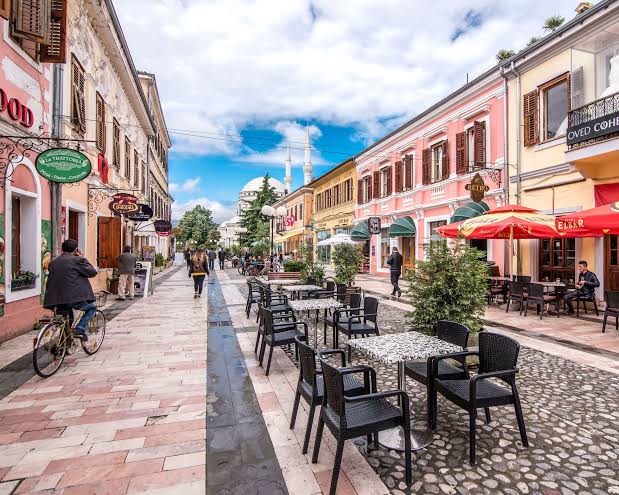
Të katra stinët mund të gjenden në këtë qytet. Në hyrje, aty tek rrethrrotullimi dhe tek e gjitha zona përreth, shtrihet një dimër i ashpër. Madje edhe në mes të gushtit. Dimër brenda, dimër jashtë. Por mbi të gjitha dimër në shikimet dhe zemrat e njerëzve. Dimër në trotuarët ku fshatarët shesin të korrurat e tyre kurse lypsqarët fytyrat.
Ishte gusht kur e vizitova Shkodrën për herë të dytë. Dhe verën e gjeta tek pedonalja plot me karanfila dhe lulebora. çdo dy hapa vozitnin dy rrota. Me ose pa njerëz sipër. Rrokulliseshin deri në fund të pedonales dhe pastaj ktheheshin pas në pikënisje.
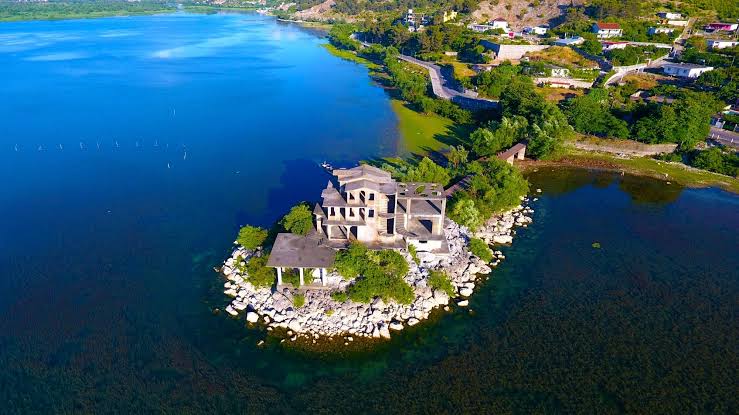
Buzëliqenit ishte gjithmonë pranverë. Peshku kishte shije dheu, kurse flladi aromë fëmijërie. Prej aty mund të dukej një kodër. Atje vegjetonte pambarim vjeshta. Gjithmonë lagështi, plot me shira, si lotët e Rozafatit dhe qumështi që lagte muret e kështjellës, dhe rrugët deri poshtë në qytet. Kur isha e vogël, sa herë vinim me eskursion këndej, të gjithë qeshnin e lodronin pranë mureve të kështjellës. Kurse unë ulesha përballë saj. S’di a më dëgjonte a më përgjigjej, por dij që qanim hallet bashkë. Lutesha gjithmonë që kur të rritesha Zoti t’më jeptë një djalë.
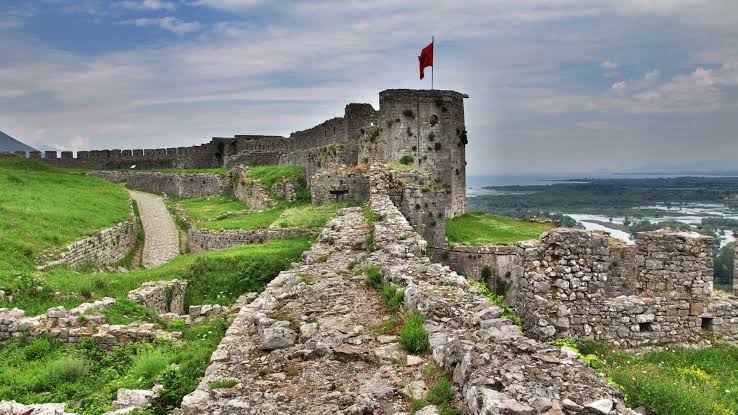
POEMA E MALLKUAR
Prindërit më braktisën dyzetëditëshe. Mu në breg të detit. Nuk më thanë asnjë fjalë, edhe pse meritoja të paktën një shpjegim. Më drejtuan atë shikimin” kur të rritesh do kuptosh. Po e bëjmë për të mirën tënde”. Fare! As edhe një fjalë. Dhe unë mbeta ashtu, fillikat, përballë këtij oqeani. Në vënd të lutjes “u rrittë me nënë e babë” dikush duhet të më këtë mallkuar. Edhe balada që recitohet në këtë vend deri në pafundësi, është e mallkuar. Kështu Deti më birësojë. U bë im atë dhe imë më. Andaj, mësova shpejt të notoja. Por disa herë edhe u mbyta. Kur zhytesha në ujra të thella, aq sa prekja dhe fundin mësova se duke mëshuar këmbët mbi cektësinë mund të japësh më shumë forcë për të mbërritur në sipërfaqe. Pikërisht ajo shtytje në ato momente të dhuron forcën për të mbijetuar.
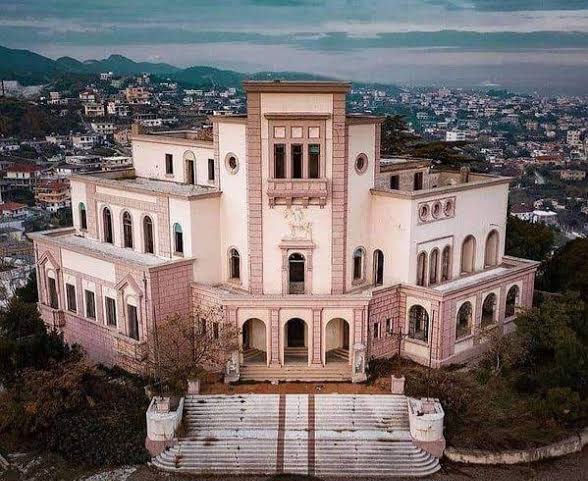
Aty posht, në fund të Detit, kuptova se si mund të ndalet koha. Aty ekziston një tjetër botë ku çdo moment i jetuar duket si një përjetësi. Pastaj mësova të luftoja kundër dallgëve, ndonjëherë dhe të dorëzohesha mbi to. Por mbi të gjitha mësova dhe të pushoja. Të tërhiqesha në breg atëherë kur fuqitë po më shterronin. Dhe ju betohem se kjo është gjëja më i vështirë. Duhet përvojë dhe superfuqi për ta arrirë, sepse askush s’ta mëson gjatë jetës. Vetëm vetë jeta. Mësova të thur kurora prej guackash, të ndërtojë kështjella rëre që zor se mund t’i rrënonte era, apo baticat. Derisa një ditë u rrita, dhe vendosa të zbuloj çfarë ka përtej Detit.
Pash që kishte palma. Në rrugën e gjatë rrethuar me palma plot, këmbët më shkelën mbi disa guraleca shumëngjyrëshe. U tërhoqa pak për të parë më mirë, kur ç’të shoh guralecat formonin imazhin e një vajzë sa e trishtë aq edhe e bukur. Rrethuar me zambakë dhe mimoza. Vajza më e bukur e këtij vendi. Me flokë prej gurash të lumenjve përreth, me sy smeraldi dhe lëkurë ngjyrë hëne. Thonë se mund të ketë qenë e bija e ndonjë pasaniku aty pari, ose ndonjë jetime që shiste trupin e vetë ditë e natë për të mbijetuar. Por ç’rëndësi ka. Vajza nuk buzëqeshte. As ajo nuk ishte e lumtur. Vështirë të jesh e lumtur në qytetin e poemave të mallkuara. Qytet i përmbytur dhe i shkundur me qindra herë. Të rritesh prej Detit është në të njëjtën kohë një bekim që të mbush mushkritë, dhe një mallkim që të thërmon kockat.
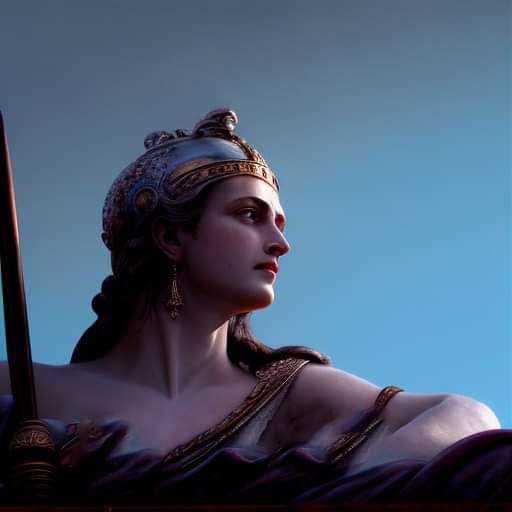
Pak më poshtë, me vështrim nga Deti, stoike në fronin e saj qëndronte një grua flokëkuqe. Mbretëreshë me profesion, grua me mision. Të gjitha vajzat e Detit e merrnin për shembull. Shumica prej tyre iu betoheshin vetes se një ditë do bëheshin të forta si ajo. A e njihte vallë Mbretëresha vajzën Bukuroshe? Me siguri do kenë jetuar në kohë të ndryshme edhe pse aq afër me njëra tjetrën. Përndryshe Shkëlqesia e saj nuk do e kishte lejuar kurrë gjithë atë trishtim në fytyrën e ndritur plot guraleca.
Të dyja i ndante një Kullë e vetmuar, që e mbante veten për Kështjellë. Një torrë nga një qytet matanë Detit. Qyteti i përmbytur në ujra, ku shtëpitë dhe ndërtesat notojnë pafundësisht. Pak më tutje, në drejtim nga djepi i diellit, mund të shihja një luftëtar që na ftonte të gjithë ta shpëtojmë Kullën e shkretë nga duart e armiqve. Nuk lëviste vendit, ditë e natë.
Duke u ngjitur në kodër, mu aty në majë zbulova një pallat të vogël mbretëror. Sa i frikshëm dhe madhështor dukej Deti prej asaj lartësie. Nuk ishte një kodër e zakonshme. Ishte një vend përrallor ku dhuroheshin përqafimet e para sapo nisnin të çelnin mimozat. Pallati mbretëror gjendej mu në fund të rrugëtimit shtruar me pisha dhe kurorzuar me mana. Familja mbretërore e kishte braktisur këtë vend duke marrë me vete të gjitha thesaret, duke na lënë duar bosh. Në maj të kodrës. Në qytetin e Vjershës së Mallkuar.